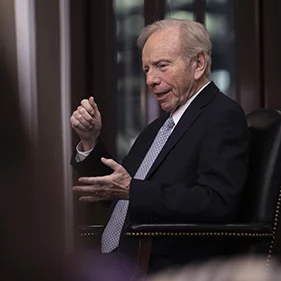Not your average Joe

Story by Geoffrey Melada. Photos by Jonathan Heisler.
Former Sen. Joe Lieberman has kept a fairly low profile since departing the Senate seven years ago. But Lieberman, who represented Connecticut in the Senate from 1989 to 2013 and was chairman of the Homeland Security Committee, was back in the newsrecently, penning a Jan. 5 op-ed in the Wall Street Journal bemoaning the lack of bipartisan support for the killing of Qassem Soleimani.
In his op-ed for the WSJ, Lieberman evoked the words of the late Republican Sen. Arthur Vandenberg, who worked with Democratic President Harry Truman on foreign policy after World War II because “politics stops at the water’s edge.”
Lieberman echoed that theme in a Jan. 14 appearance at Manhattan’s Yale Club on behalf of the Joseph Slifka Center for Jewish Life, home of Yale Hillel.During an onstage interview with Jewish Yale alumna and The New York Times reporter Robin Pogrebin, Lieberman, a graduate of Yale University and Yale Law School, waxed nostalgic for a more civil era in our national politics and discourse.
He pointed to his deep friendship with the late Republican Sen. John McCain of Arizona, his travel partner on many overseas trips as members of the Senate Foreign Relations Committee. Nowadays in Congress, he said, members of opposing political partiesrarely make time get to know one another.
“The increasing polarization of our political parties has made it harder to welcome the opportunity to have dialogue, discuss, debate with people who don’t agree with you,” Lieberman told an audience of Jewish Yale alumni. “Jewishlearning teaches the practice of civil discourse. The Talmud is rich with examples of passionate, vigorous arguments while having great respect for one’s debater.”
Perhaps the most famous example, Lieberman said, is the doctrinal debate between the schools of Hillel and Shammai. “They argued vigorously, but they respected each other. Hillel’s ruling was accepted by heaven because his school presentedShammai’s view with respect before disagreeing with it.”
During his Senate career, things got accomplished, he said, because of the presence of moderates who could reach across the aisle. “There are few people in the middle today. People in the middle get battered.”
“I hope we can step back from that,” he added.
Lieberman also lamented the rise in anti-Semitic incidents in the country.
“I was raised to believe you don’t need to assimilate to be successful,” Lieberman said. His Judaism (Lieberman identifies as Modern Orthodox and is shomer Shabbat) was no hindrance to serving as former Vice President Al Gore’srunning mate in the 2000 presidential election.
“Gore broke barriers. I was the first Jewish person chosen for the vice-presidential ticket. Gore asked his close friends if America was ready for a Jew to be one heartbeat away from the presidency. His Christian friends all said, ‘No problem.’”In fact, Lieberman said, voters respected his deeply held beliefs and that he was consistent about refraining from politics on Saturdays.
The crowd laughed when Lieberman recalled how Gore, who is Christian, offered to “watch the store on Saturdays” in exchange for Lieberman working Sundays.
At that time, he said, “there was a prevailing ethic of acceptance that kept anti-Semites under a rock.” Today, “anti-Semitism has clearly reared its head.” A major factor is social media, he said, with people like the shootersin Poway and Pittsburgh “inhaling hate on the internet.”
Lieberman also reflected on his college experience during the hour-long Q&A session. Jewish life on campus was “quite primitive” when he started Yale as a freshman in 1960 compared to today.
“That’s part of why I am so excited about the Slifka Center,” Lieberman said. “I’m overwhelmed by what was created.”
In his remarks following Lieberman’s talk, Uri Cohen, executive director of the Slifka Center, said momentum is building for Yale’s Hillel and the best is yet to come.
He and his talented staff are working to “position Slifka Center as an indispensable campus partner with Yale itself, advancing the interests of all Yale students – not just the Jewish ones.” As proof, Cohen pointed to the factthat Hillel International recognized the Slifka Center with the 2019 Campus Partnership Award last month.
“Our job on campus is to inspire the next generation who will lead this country in just a few short years,” said Cohen, and to “energetically tackling the major issues facing college students at Yale and beyond,” issues includingpluralism, Israel, love, loneliness, gender, power, mental health and wellness.
Rabbi Jason Rubenstein, the Howard M. Holtzmann Jewish Chaplain at Yale and Slifka Center’s senior rabbi, agreed.
“Every day we are working to support Jewish students, and to make the case that a life lived in deep engagement with Judaism and the Jewish community will be rewarding, will make good use of their talents, will bring them into dialogue with diversefriends and ideas — and will ultimately enrich their lives.”
To learn more about Yale Hillel, visit slifkacenter.org.